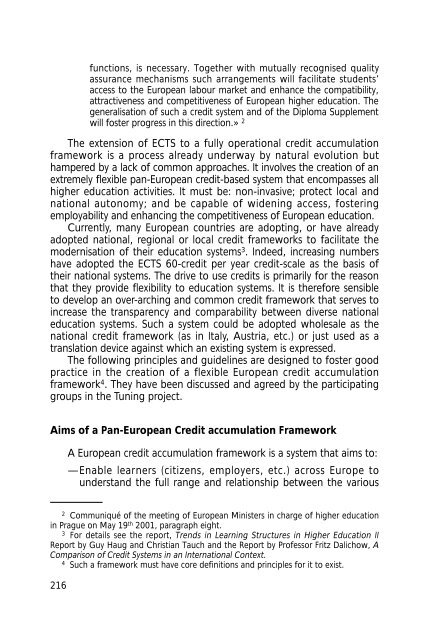- Page 1 and 2:
Final ReportPilot Project - Phase1C
- Page 4 and 5:
Tuning EducationalStructures in Eur
- Page 6 and 7:
List of ParticipantsJoint General C
- Page 8 and 9:
—Universität Göttingen - Matthi
- Page 10 and 11:
—Universitá degli Studi di Bolog
- Page 12 and 13:
Map of the Tuning Member Institutio
- Page 14 and 15:
ContentPART ONEPreliminary Remarks
- Page 16:
PART ONE
- Page 19 and 20:
generous financial support but also
- Page 21 and 22:
Transfer and Accumulation System (E
- Page 23 and 24:
By learning outcomes we mean the se
- Page 25 and 26:
—To create European networks able
- Page 27 and 28:
The provision of reference points a
- Page 29 and 30:
transmission of knowledge. Elements
- Page 31 and 32:
enhancement of mobility, not only o
- Page 33 and 34:
of a second language, ability to co
- Page 35 and 36:
—show understanding and implement
- Page 37 and 38:
study. As part of this phase each o
- Page 39 and 40:
does not imply that it is not possi
- Page 41 and 42:
academics the opportunity to exchan
- Page 43 and 44:
elationship between educational str
- Page 45 and 46:
—ECTS as a Europe-wide accumulati
- Page 47 and 48:
outside the framework of a programm
- Page 49 and 50:
If the aims of Universities come to
- Page 52 and 53:
General Conclusionsand Recommendati
- Page 54:
subject areas. Because of these rea
- Page 58:
LINE 1Generic Competences
- Page 61 and 62:
consultations are important. It fur
- Page 63 and 64:
organization of learning. Each of t
- Page 65 and 66:
In fact, the relationship between r
- Page 67 and 68:
5.1. The objectivesThe objectives o
- Page 69 and 70:
eformulation, these general skills
- Page 71 and 72:
In April, 2001 a draft of the first
- Page 73 and 74:
—Questionnaire for Graduates:•
- Page 75 and 76:
IMPORTANCEConcentration+ -Low Prior
- Page 77 and 78:
The aim of both questionnaires was,
- Page 79 and 80:
error of any estimate produced. The
- Page 81 and 82:
all items were again calculated usi
- Page 83 and 84:
GraduatesEmployersLabel Description
- Page 85 and 86:
ACADEMICSThe academics were asked t
- Page 87 and 88:
The most striking difference is tha
- Page 89 and 90:
skills in the definition and develo
- Page 91 and 92:
subject-related competences for the
- Page 93 and 94:
—However, in relation to the issu
- Page 95 and 96:
GOLDSTEIN, H. and SPIEGELHALTER, D.
- Page 97 and 98:
THE QUALITY ASSURANCE AGENCY FOR HI
- Page 100 and 101:
Business Subject Area Group:Subject
- Page 102 and 103:
KnowledgeAcquisitionand WideningCor
- Page 104 and 105:
CycleModuleFirst First Second Secon
- Page 106 and 107:
CycleModuleFirst First Second Secon
- Page 108 and 109:
Modules: Knowledge deepening (Verti
- Page 110 and 111:
Chemistry Subject Area Group:The Ch
- Page 112 and 113:
It must be made clear at the outset
- Page 114 and 115:
—The structural features of chemi
- Page 116 and 117:
probably requiring 15 credits. Thus
- Page 118 and 119:
large proportion of his studies on
- Page 120 and 121:
Attainment Level a (highest):—Kno
- Page 122:
the framework necessary to provide
- Page 125 and 126:
A second preliminary remark will re
- Page 127 and 128:
—teaching/learning material, and
- Page 129 and 130:
Against this background and followi
- Page 131 and 132:
Despite the many differences specif
- Page 133 and 134:
As regards secondary level teacher
- Page 135 and 136:
and/or modules that could meet the
- Page 137 and 138:
The only possible aim to agree on a
- Page 139 and 140:
2. Programmes, knowledge and skills
- Page 141 and 142:
investigations for civil engineerin
- Page 143 and 144:
—collecting, recording and analys
- Page 145 and 146:
4. Performance levelsIn this sectio
- Page 147 and 148:
eceive a History degree. (In some c
- Page 149 and 150:
—The group underlines particularl
- Page 151 and 152:
obvious that the first principle is
- Page 153 and 154:
or broader world history. Mapping t
- Page 155 and 156:
ANNEX 1Proposed Formulation in gene
- Page 157 and 158:
ANNEX 2List of Subject Specific Ski
- Page 160 and 161:
Mathematics Subject Area Group:Towa
- Page 162 and 163: a) He/she will be legally recognise
- Page 164 and 165: —a list of contents;—a list of
- Page 166 and 167: knowledge will commonly be designed
- Page 168: 5. A common framework and the Bolog
- Page 171 and 172: Physics Network. They relied on som
- Page 173 and 174: The rating values can be ordered in
- Page 175 and 176: Table 3Competences ordered by impor
- Page 177 and 178: attitude is confirmed by the result
- Page 179 and 180: Table 4Competences ordered by «gap
- Page 181 and 182: oth physics degrees. It is a kind o
- Page 183 and 184: 2 puzzling aspects, related to some
- Page 185 and 186: elow), the final year thesis work,
- Page 187 and 188: connection, the Socrates Thematic N
- Page 189 and 190: Of course the core content can be f
- Page 191 and 192: Table 2Correspondence between the e
- Page 193 and 194: Some further clarifying remarks are
- Page 195 and 196: The main point here is that the com
- Page 197 and 198: In Fig. 3 we present the common cre
- Page 199 and 200: ANNEX 1 (first part)Institutions wi
- Page 201 and 202: ANNEX IIThe Common Core Content of
- Page 203 and 204: Table IEUPEN WG2 Questionnaire - Ma
- Page 205 and 206: A first general remark concerns the
- Page 207 and 208: involved cycle. These latter number
- Page 209 and 210: enough there are no great differenc
- Page 212: Line 3New Perspectives on ECTSas an
- Page 217 and 218: —Allow transference with other no
- Page 219 and 220: statements that provide a general g
- Page 221 and 222: PRAGUE COMMUNIQUÉ (2001). Prague C
- Page 223 and 224: importance of a subject or the numb
- Page 225 and 226: 0. IntroductionThis paper aims to o
- Page 227 and 228: 1.2. Relative and absolute value of
- Page 229 and 230: e included in their own degree prog
- Page 231 and 232: misunderstanding occurred about the
- Page 233 and 234: The subject related theoretical and
- Page 235 and 236: In any kind of system, modular or n
- Page 237 and 238: pre-condition for such a European w
- Page 239 and 240: learning time is the number of hour
- Page 241 and 242: 25 to 30 hours of student workload.
- Page 243 and 244: from institution to institution and
- Page 245 and 246: for today’s student. It implies t
- Page 247 and 248: the Tuning project that if the next
- Page 249 and 250: —The difference in terms of the t
- Page 252: Glossary, WWW Goldmineand Appendixe
- Page 255 and 256: Comprehensive examASSESSMENT of the
- Page 257 and 258: THESIS. It is generally referred to
- Page 259 and 260: MarkAny numerical or qualitative sc
- Page 261 and 262: WorkloadAll learning activities req
- Page 263 and 264:
— European Network for Quality As
- Page 265 and 266:
— Big Business und Big Bang. Beru
- Page 267 and 268:
Newsletter— Education and Culture
- Page 270:
Appendix IQuestionnaires used
- Page 273 and 274:
6. Do you feel that the education y
- Page 275 and 276:
Level to whichSkill/Competence Impo
- Page 277 and 278:
Questionnaire for academicsRanking
- Page 279 and 280:
BusinessQuestionnaire for academics
- Page 281 and 282:
ChemistryQuestionnaire for academic
- Page 283 and 284:
Specific Competences26. Study skill
- Page 285 and 286:
Specific CompetencesImportance Impo
- Page 287 and 288:
Specific Competences14. Receiving a
- Page 289 and 290:
Specific Competences34. Ability to
- Page 291 and 292:
MathematicsQuestionnaire for academ
- Page 293 and 294:
PhysicsQuestionnaire for academicsS
- Page 295 and 296:
Specific Competences55. Be able to
- Page 298:
Appendix IILength of Studies
- Page 301 and 302:
Present/ForeseenCountry Subject Are
- Page 303 and 304:
Present/ForeseenCountry Subject Are
- Page 305 and 306:
Present/ForeseenCountry Subject Are
- Page 307 and 308:
Present/ForeseenCountry Subject Are
- Page 309 and 310:
Present/ForeseenCountry Subject Are
- Page 311 and 312:
Present/ForeseenCountry Subject Are
- Page 313 and 314:
Present/ForeseenCountry Subject Are
- Page 315 and 316:
Present/ForeseenCountry Subject Are
















